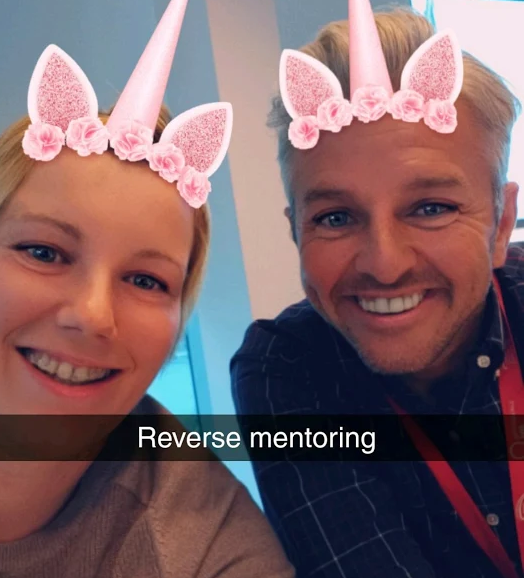Most good companies offer a mentoring scheme where traditionally older, more experienced members of staff work with younger employees, to share their wisdom and knowledge. However, young people aren’t the only ones who can benefit from learning from others in the office and so at PMP have been exploring the concept of “reverse mentoring” which pairs older workers with younger ones for mutual benefit.
I first came across the concept of reverse mentoring when I was working in the US and where it has been around for some time but has been slow to gain momentum. Credit for bringing the practice to the United States often goes to retired General Electric CEO Jack Welch, who allegedly returned from an overseas trip in 1999 and ordered his top leaders to find a junior-level mentor to teach them computer skills.
Integrating social media with millennials
My reasons for wanting to explore this were quite simple. I felt that I could benefit from learning a thing or two about integrating tools like social media and crowd sourcing into our business and hoped that I could pass on some of the business experience I have gained over the years.
To be clear, it isn’t that me and my senior team weren’t using technology – of course we were – but the fact is that this millennial generation were born with access to the Internet at their fingertips and have literally grown up with it. However, there was more to my idea than just learning how to jazz up my Twitter feed or avoid embarrassment on Snapchap. If I am honest I also want to learn more about the millennial generation. Also known as ‘Generation Y’, millennials make up 1.8 billion of the world’s population and is estimated to form 75 per cent of the workforce by 2030. For many of my team our connection to the millennial generation is largely through our parenting skills, yet they are increasingly the people we need to influence, sell to and employ, so understanding them is key for future success.
See more:
The essential guide to business mentoring
How to find the right mentor to build your career confidence
Should you have a career mentor? The real-life business benefits
The benefits of reverse mentoring
My experience of reverse mentoring so far has shown me that although I have undoubtedly benefitted from some excellent training on the latest social media platforms, what I have also really enjoyed is the candid feedback I receive on all aspects of the business. As a managing director you often receive highly-filtered information but younger, more junior people haven’t learned what they can’t say. For me this is highly refreshing and I have seen a new side to my business and my colleagues all say the same. The lack of cynicism and a belief that anything is possible is, quite frankly, a welcome change.
But has it been so good for our mentors? The feedback we have had is that these junior professionals really enjoy more exposure to the senior team and this has helped to build confidence. There is a strong feeling that their voices are being heard and that they are really contributing to the success of the business. As a result of some of these sessions we are re-evaluating how our middle management communicates within the organisation and looking at ways to empower junior staff to speak up with questions or concerns.
Encouraging diversity through mentoring
So what lessons have I learned? Well, I know from my experience in the US and here that any reverse mentoring programme works best if it was tied to a specific business need and isn’t just seen as the latest fad. Finding the right matches is crucial, as is the need to set up ground rules, spell out expectations and invest in training. It needs full buy-in from the senior team and in many cases requires quite a strong cultural shift as it challenges the traditional hierarchy of business relationships. (It is worth noting that it can be unnerving for a senior member of the organisation to embrace the idea that you can actually learn from somebody younger!)
It can also help facilitate a cultural transition from talking to listening. Being in the position of learning something new from a person who may have quite a different background or be less qualified on paper requires us to open-up. This means dropping your defences and letting go of preconceived biases. An experience transferable to many work situations, reserve mentoring requires everyone involved to work a bit more to really listen.
In conclusion, I believe that reverse mentoring can have a huge impact on the entire organisation. Millennials can gain valuable insight and knowledge that comes from their counterparts’ decades of business experience, while the seasoned leaders absorb a lot of information about new technology, the latest best practices and fresh techniques for doing things. This helps both parties be more productive individually and helps to strengthen the relationships between them to create solid teamwork.
For us at PMP it is helping me and my team to stay ahead and also gain valuable insight into the next generation.
Jamie Reynolds is the managing director at PMP Recruitment






